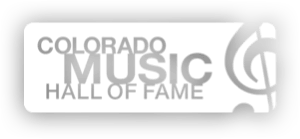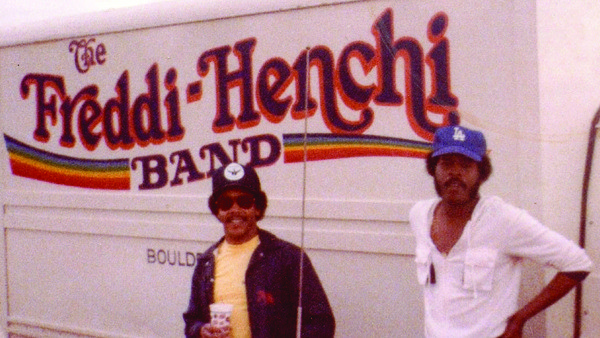By Connor Lukes, University of Denver Journalism Intern
We catch up with the 2019 Hall of Fame inductee and honoree for Black History Month Freddi Gowdy, founding member of the Freddi-Henchi Band alongside the late Marvin “Henchi” Graves. From growing up poor in the projects to performing overseas, Gowdy humbly shares his experiences as a small-town musician who grew into his groove ahead of the ‘70s funk boom. Originally known as Freddi-Henchi and the Soulsetters, the band slowly grew their influence over the course of fifteen years playing venues across the western United States. Freddi & Henchi gained a significant following in Boulder with their rockin’ performances and signature dance moves. It wasn’t long before they were named Colorado’s “Crown Princes of Funk.” Freddi & Henchi served as co-bill and opened for other iconic acts such as Steely Dan, the Nitty Gritty Band, Chicago, John Denver, and Earth Wind & Fire, just to name a few. The Colorado Music Hall of Fame is proud to be featuring Freddi & Henchi as part of our renovated exhibits coming in March and April to the Red Rocks Trading Post.
When did you decide to become a professional musician?
I started off in Arizona. I was in the choir in high school, and my music teacher, a beautiful lady, her name was Mrs. Light, kept telling me ‘you have talent and you should keep going.’ I took the class as an easy grade, and I started listening to different types of music. Then one of the guys in my chorus suggested that I try out for this band that was around Arizona, and they were called the Soul Setters. I waited and waited, you know, wasn’t ready to do it. They kept calling me and calling me…a lot of it was I didn’t think I could sing like the other guy; he was a good singer, but then he got drafted. The guy that put me in the band came over to my house, and we sat down and he talked [me into joining].
As a black musician in the ‘60s, what sort of obstacles did you face? Were there any clubs that would not let you play?
Right, that’s a good question, because it did hold us back a couple times. A lot of the time [club owners] would look at the lineup, and they would see two Black guys, two Hispanic guys, two Native American Indian guys. They would say to themselves, ‘What the hell? Who the hell are these guys!?’ Then we had the flashy stuff! We were all flashed out. Colorado was, you know, [wasn’t] used to that. California, yes. Arizona, yes. Colorado was not used to the flashy stuff. Colorado was mainly folk music back in the day.
A couple of times we got stuff thrown at us up in Fort Collins. Really, those five clubs were, there was nothing around those places. I mean, it was out in the country [in the ‘60s].
The performance was there. Vocals, kind of there. But the live stuff, the back flips and lifts and all that stuff, we killed on that! We knew we had our ace in the hole when we performed. All the records we recorded just couldn’t get over the hump. That’s the only thing that held us back was the records that were recorded. We opened for a lot of big acts before they were big acts. You know what I mean? We were like the second bill or third bill.
Your band got its big break in Colorado in Fort Collins?
Sort of, yeah. One of the first places we played in Colorado was Fort Collins. Then, we went to Boulder and played the Skunk Creek Inn. It was owned by Al Roth. He owned Herman’s Hideaway. [Skunk Creek Inn] was rockin’. It was one of our better places to play. And it was fun. We played with Chuck Berry there…Bo Diddley, too. Their careers, you see them with the Stones and all that. But back then, they were just doing the old nightclubs the way we were doing.
Everyone talks about Henchi’s nickname from his wrestling days, but how did your nickname “Freddi Love” come about?
The agent that we were working with said Freddi Gowdy just doesn’t have that Umph! So from now on your name is Freddi Love. I hated that name! I said, “oh, okay, can you change it?” No, and when I get back to Arizona, sometimes I hear “Hey! Freddi Love!” Yeah, I don’t particularly like that name. But I had to use it.
Could you talk about your fashion from the era? You’ve loaned several items for The Hall’s display, including some of Henchi’s beautifully crafted outfits by designer Valerie McCreary. How did the band get in contact with her?
She made clothes for Elton John, Tommy Bolin, a bunch of acts. And she was very, very good. She would come and see the band. It took her maybe two weeks [to make the costumes] if she didn’t have one of the big bands from Caribou [Ranch] or something. [Henchi] would give his input on what he wanted.
Sometimes the whole band would wear [the costumes]. Especially on special shows when we were second or third bill, we would dress splashdown.
You’ve lately been performing with fellow Colorado Music Hall of Fame inductee and former Director of The Hall, Chris Daniels; how did you guys start playing together?
He called me. Chris got sick, and I went to see the band over at Elway’s and he had just got out, maybe two weeks out of the hospital. He tried to get up there and play, and it was like 100 and something [degrees] out. He got up there, and he was doing fine. Then he got sick up there on stage…I’m sitting there, and he called me over and said, ‘You think you can do a couple of numbers and help me out?’ I go, ‘Yeah, yeah, I’ll do a couple of numbers.’
Then a month later, he called me and asked me if I wanted to join the band. I really don’t sing his type of stuff. He does R&B, but he also does swing, rock and roll. He’s not locked into funk, and I wasn’t sure if I could do it, so I said ‘Yeah, let’s try.’ We got together, rehearsed and then it worked out fine.
What career moments or successes are you most proud of?
When I went to play for the USO show, we went overseas to Japan [and Korea], ‘89, ‘90, something like that. We played for the troops…It’s one of the wildest things you’ve ever seen. 5,000 guys dancing with each other. It’s like, wow!
[Another moment is playing] third bill with James Brown in the ‘70s; it was in Arizona. Then there was the first time we ever played the Whisky a Go Go, and the first time we ever played Troubadour.
The Hall of Fame, for me, after all those years being on the road and opening up for these guys and coming close, very close to making it, the Hall of Fame has got to be up there. Number one for me.

